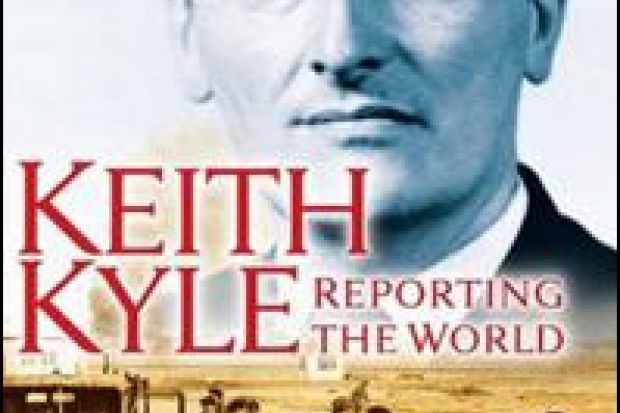Keith Kyle stood out, as his friend Godfrey Smith once observed. They met at Magdalen College, Oxford, after the Second World War. "Six feet three, lean, vague, aquiline, scholarly, he looked like some benign bird of paradise that had wandered into the cloisters. An improbable former infantry captain, he came up to read history under A.J.P. Taylor in 1947, and quickly made his name as a precocious (Oxford) Union speaker. He delivered his speeches - cogent, fluent and learned - without a note. He composed his own budget for fun each year just before the chancellor delivered his," Smith recalls.
Kyle was formidably well equipped and wonderfully well connected. He was also chronically absent-minded and prone to periodic, debilitating illnesses. He writes about "the nameless physical conditions which haunted me all my life", and in retrospect it seems that he suffered from ME, then undiagnosed. All of this makes for a life rich in incident and self-knowledge. It is recounted here without a note, as it were, with the sure-footed stylishness of a polished public speaker. As reporter, writer and presenter, Kyle bestrode his world, and his autobiography tells of his suavity and his humanity: professional mastery anchored in essential modesty; "luminous certainty" spiked by messy contingency; and a certain delicacy checked by a strict decorum.
The Kyle style is scrupulous, with a dash of the mischievous. He evokes a world we have lost, but a cast of characters and attitudes which still resonate deep in the culture. The manner of the man and the nature of the style is encapsulated in a bravura passage from 1956, in the toils of the Suez crisis: "'What do they think of Eden in the United States?' The question came in a deep, booming voice issuing implausibly from a frail, bejewelled old lady who had just moved slowly into her dining room clad in two fur coats, one on top of the other. This was the first time I had met my father's last employer, Cornelia, Countess of Craven, and I had been invited with my parents to lunch mainly, I suspected, so that I should answer precisely this question. I had it in mind that Anthony Eden had married as his second wife the daughter of Lady Craven's beloved friend Goonie, the sister-in-law of Winston Churchill. 'I am afraid that they don't think much of him at the moment,' I ventured in reply. Lady Craven brought the huge ruby ring on her finger crashing to the table as she roared, 'I always knew young Anthony was rash' - the last word uttered with phenomenal emphasis. She put me in mind of Dame Edith Evans in The Importance of Being Earnest and, on a separate occasion when the name of that actress was rather naughtily cited by my mother, Lady Craven, raising one arm pronounced, 'A trifle manieree, don't you think?'"
The names of Kyle and Suez are now inextricably linked, as he well knew, since his chronicle of the crisis (first published in 1991 and much reprinted) immediately established itself as the most authoritative work ever written on that tortured and tortuous history. If there is a sliver of irony (and perhaps a hint of autobiographical irritation) in someone so versatile being so closely identified with a single subject, Suez was surely the magnum opus he was born to write.
Kyle had observed the crisis unfolding from his eyrie as Washington correspondent of The Economist; in 1976, he wrote and presented a four-part television history for the BBC's celebrated Tonight programme, followed in 1986 by a one-hour special, The Secrets of Suez. Over time, he appeared to have interviewed every participant and examined every document, yet he was not overwhelmed by his material. Kyle was a professional: he knew how to shape a good story. Suez is a long book that reads short. Unlike many histories, it is fully matured, and packed with pithy acuity. "The single word 'Nasser', spoken or written in fear, derision or loathing, became the curse-word of the times, only separated by a decade, it should be remembered, from the emotions of the Second World War. But to understand the spirit of Britain during Suez one needs to sense the polemical spin which British people in those strangely turbulent days imparted to the simple military rank of 'Colonel'."
Kyle had learned well from his old tutor, A.J.P. Taylor, who became his friend. Reporting the World has a poignant vignette of Taylor in decline. Suez has an epigraph and conclusion from Taylor in his prime. It is a fitting tribute to the panache they shared. "The moral for British Governments is clear. Like most respectable people, they will make poor criminals and had better stick to respectability. They will not be much good at anything else."
Reporting the World
By Keith Kyle
I. B. Tauris, 320pp, £25.00
ISBN 9781848850002
Published 17 June 2009
Register to continue
Why register?
- Registration is free and only takes a moment
- Once registered, you can read 3 articles a month
- Sign up for our newsletter
Subscribe
Or subscribe for unlimited access to:
- Unlimited access to news, views, insights & reviews
- Digital editions
- Digital access to THE’s university and college rankings analysis
Already registered or a current subscriber?
